#character: charles lancaster
Text
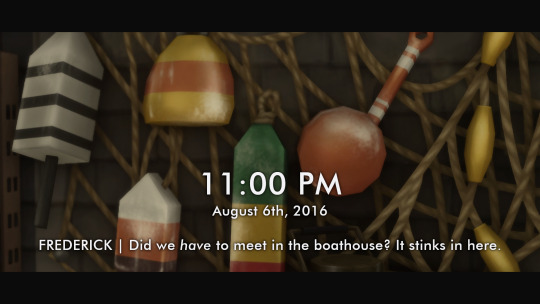
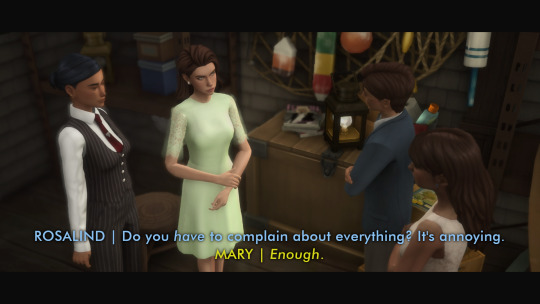
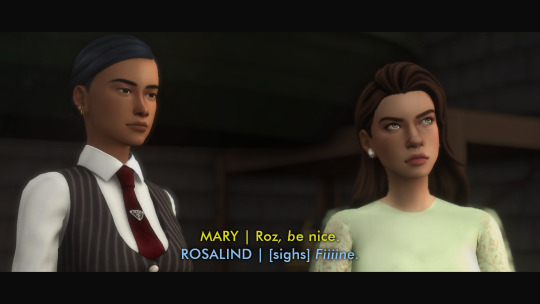

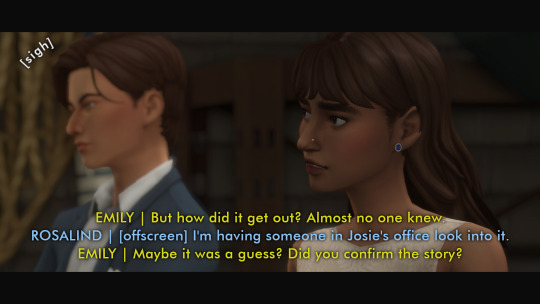
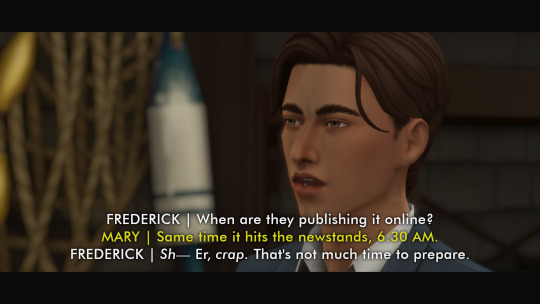
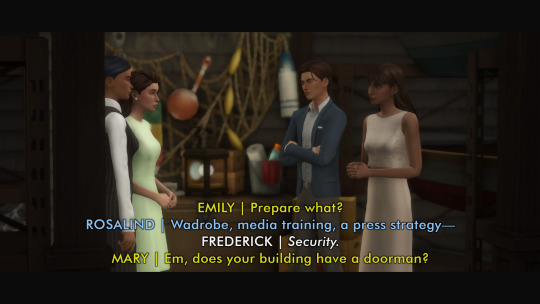
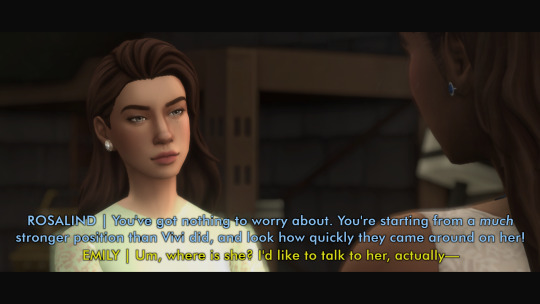
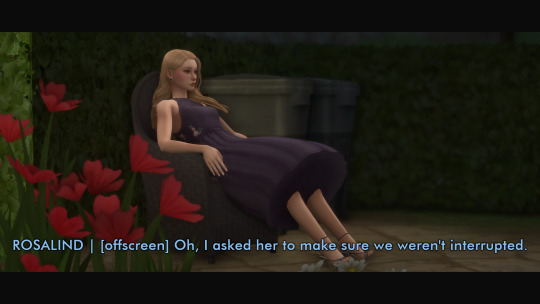
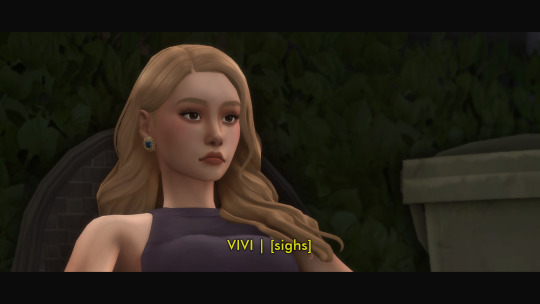
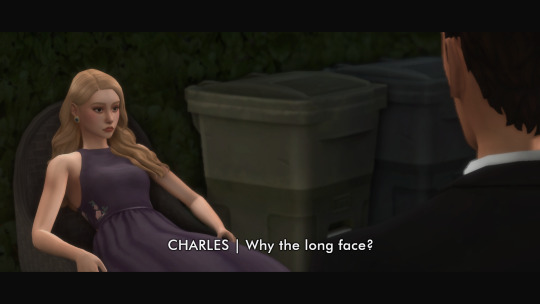
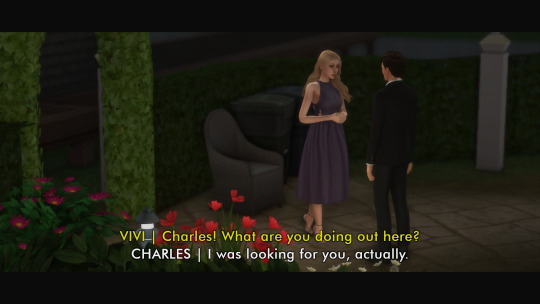
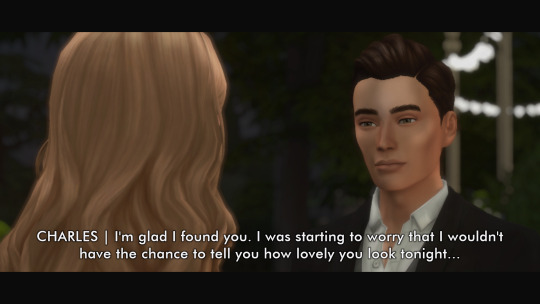
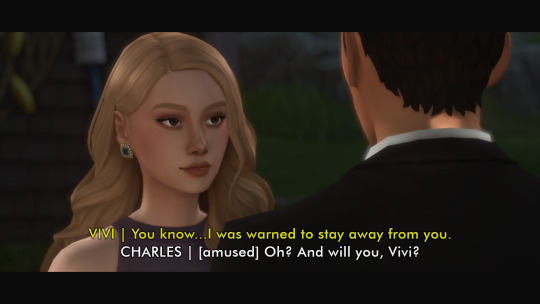
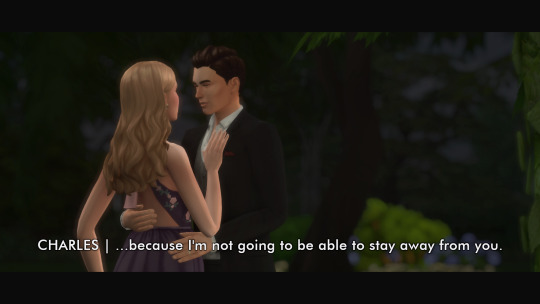
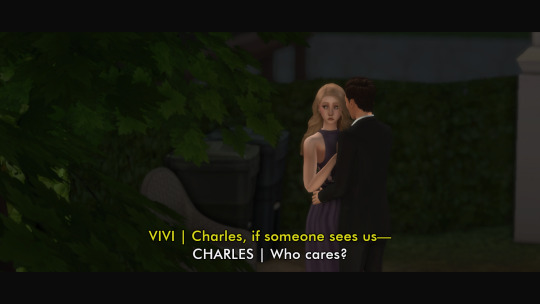
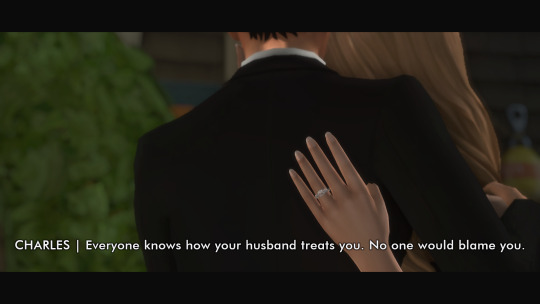

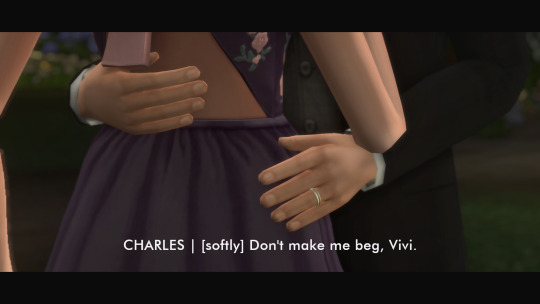
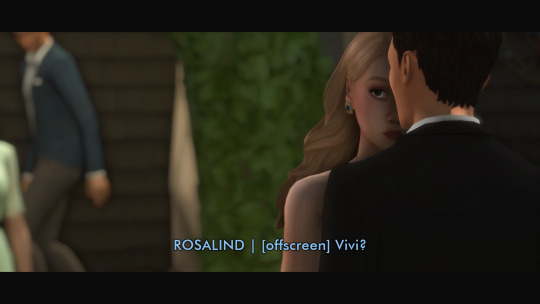
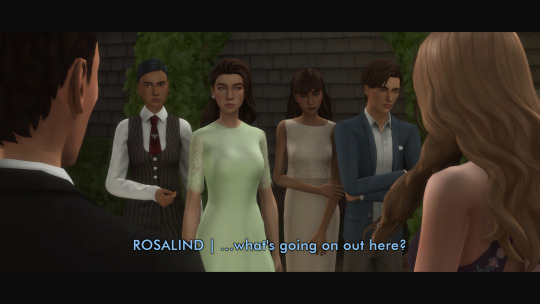
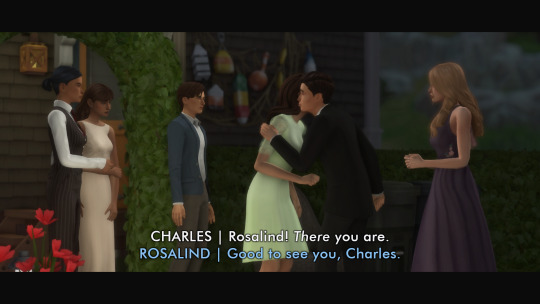
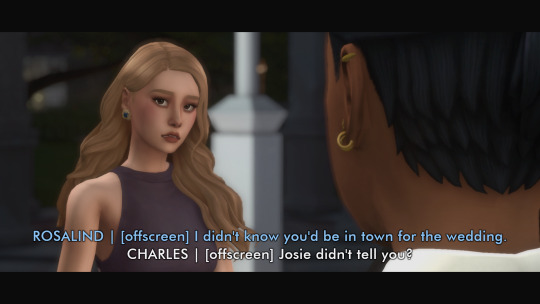
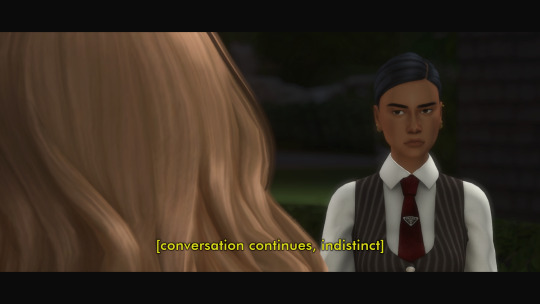
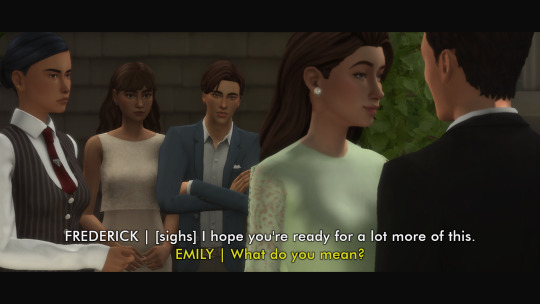
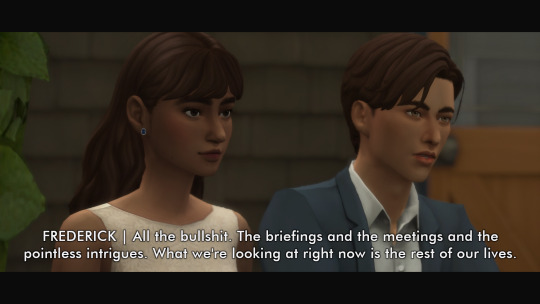
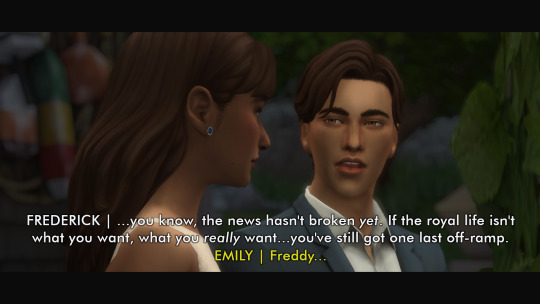
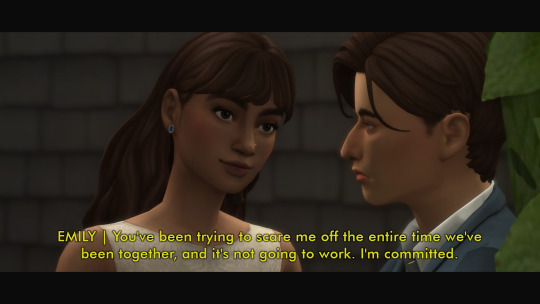
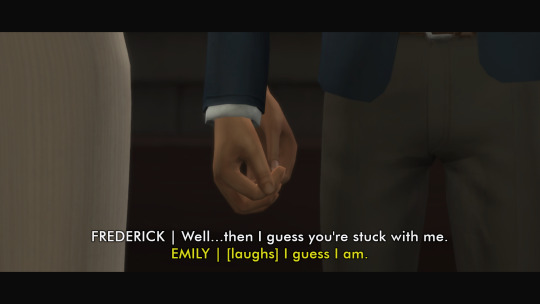
Previous | Chapter Start | Beginning | Next
author's note: welcome to the denouement! charles, as always, belongs to @the-lancasters
Transcript under the cut.
11:00 PM / August 6th, 2016
FREDERICK | Did we have to meet in the boathouse? It stinks in here.
ROSALIND | Do you have to complain about everything? It's annoying.
MARY | Enough.
MARY | Roz, be nice.
ROSALIND | [sighs] Fiiiiiine.
ROSALIND | You two are the front page of The Shield on Sunday. Vance Marshall called me to ask for comment.
EMILY | But how did it get out? Almost no one knew.
ROSALIND | [offscreen] I'm having someone in Josie's office look into it.
EMILY | Maybe it was a guess? Did you confirm the story to them?
FREDERICK | [sighs]
FREDERICK | When are they publishing it online?
MARY | Sane time it hits the newstands, 6:30 AM.
FREDERICK | Sh— Er, crap. That's not much time to prepare.
EMILY | Prepare what?
ROSALIND | Wardrobe, media training, press strategy—
FREDERICK | Security.
MARY | Em, does your building have a doorman?
ROSALIND | You've got nothing to worry about. You're starting from a much stronger position than Vivi did, and look how quickly they came around on her!
EMILY | Um, where is she? I'd like to talk to her, actually—
ROSALIND | [offscreen] Oh, I asked her to make sure we weren't interrupted.
VIVI | [sighs]
CHARLES | Why the long face?
VIVI | Charles! What are you doing out here?
CHARLES | I was looking for you, actually.
CHARLES | I'm glad I found you. I was starting to worry that I wouldn't have the chance to tell you how lovely you look tonight...
VIVI | You know...I was warned to stay away from you.
CHARLES | [amused] Oh? And will you, Vivi?
CHARLES | ...because I'm not going to be able to stay away from you.
VIVI | Charles, if someone sees us—
CHARLES | Who cares?
CHARLES | Everyone knows how your husband treats you. No one would blame you.
VIVI | Charles...
CHARLES | [softly] Don't make me beg, Vivi.
ROSALIND | [offscreen] Vivi?
ROSALIND | ...what's going on out here?
CHARLES | Rosalind! There you are.
ROSALIND | Good to see you, Charles.
ROSALIND | [offscreen] I didn't know you'd be in town for the wedding.
CHARLES | [offscreen] Josie didn't tell you?
[conversation continues, indistinct. Mary gives Vivi A Look.]
FREDERICK | [sighs] I hope you're ready for a lot more of this.
EMILY | What do you mean?
FREDERICK | All the bullshit. The briefings and the meetings and the pointless intrigues. What we're looking at right now is the rest of our lives.
FREDERICK | ...you know, the news hasn't broken yet. If the royal life isn't what you want, what you really want....you've still got one last off-ramp.
EMILY | Freddy...
EMILY | You've been trying to scare me off the entire time we've been together, and it's not going to work. I'm committed.
FREDERICK | Well...then I guess you're stuck with me.
EMILY | [laughs] I guess I am.
#armorica story#chapter 2#chapter 2 part 3#behind the scenes#character: rosalind st. fleur#character: frederick st. fleur#character: mary yokoyama#character: emily chandra#character: vivienne meijer#character: charles lancaster#armorica collabs#the-lancasters#infidelity cw
30 notes
·
View notes
Photo
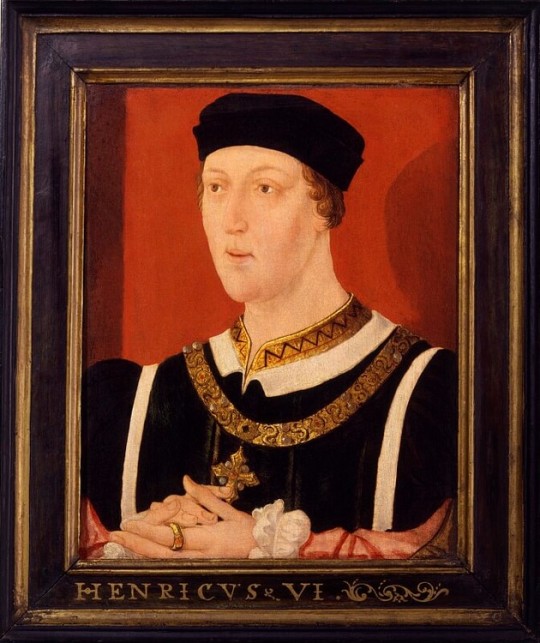
Henry VI of England
Henry VI of England ruled as king from 1422 to 1461 CE and again from 1470 to 1471 CE. Succeeding his father Henry V of England (r. 1413-1422 CE), Henry VI was crowned the king of France in 1431 CE but he could not prevent a French revival led by Charles VII of France (r. 1422-1461 CE) and such figures as Joan of Arc (c. 1412-1431 CE). The Hundred Years' War (1337-1453 CE) was ultimately lost and with it all England's territory in France except Calais. Back in England, the king's weakness of character and mind, and the intense rivalry between his barons led to the conflict known as the Wars of the Roses (1455-1487 CE) between the rival houses of Lancaster and York. After an episode of insanity, Henry VI had, in effect, a regent, Richard, the Duke of York in 1454 CE. Despite military victories by Henry's wife, Queen Margaret, the king was ultimately deposed by Richard's son Edward in 1461 CE. Henry would make a brief return to the throne in 1470 CE before Edward, now Edward IV of England (1461-1470 & 1471-1483 CE), was once more victorious on the battlefield and able to declare himself king for a second time. Henry was then murdered in the Tower of London in May 1471 CE.
Succession
Henry was born on 6 December 1421 CE in Windsor Castle, the son of Henry V of England and Catherine of Valois (l. 1401 - c. 1437 CE), the daughter of Charles VI of France. The reign of Henry's father was short but brilliant. Pressing his claim to the French throne, which had started with Edward III of England (r. 1327-1377 CE), Henry V had won a famous victory against a French army at the Battle of Agincourt in October 1415 CE and then conquered Normandy between 1417 and 1419 CE. This was to be the peak of English fortunes during the on-off conflict between the two countries known to history as the Hundred Years' War. The victories allowed Henry V to sign the 1420 CE treaty of Troyes with Charles VI of France (r. 1380-1422 CE) which made Henry the French king's heir while the blood heir, the Dauphin Charles, was disinherited. All this happened while France was split between two rival factions: the Burgundians and the Armagnacs.
The English barons would entangle themselves in a spiral of competition to see who could hold most power while Henry remained a minor.
Henry V died, probably of dysentery on 31 August 1422 CE at Bois de Vincennes in France. The English king had missed the chance to become the king of France by less than two months as Charles VI died on 21 October 1422 CE. Prince Henry, not even one year old, became the new king of England and the youngest to hold such a title before or since. He would not receive his coronation until 6 November 1429 CE in Westminster Abbey, officially becoming Henry VI of England. In the meantime, the infant had two regents, appointed by Henry V before his death: Humphrey, Duke of Gloucester (l. 1390-1447 CE) for England and John, Duke of Bedford (l. 1389-1435 CE) for the territories in France, where, at least according to the Treaty of Troyes, he was also now the king. Another important figure was the king's great-uncle, Henry Beaufort, Bishop of Winchester. These three men and others would entangle themselves in a spiral of competition to see who could hold most power while Henry remained a minor.
The Wars of the Roses were not over yet, though. Edward, the Duke of York's son, backed by the Earl of Warwick, was promoted as a replacement to his father and to King Henry. When Edward won the bloody Battle of Towton in March 1461 CE, the largest and longest battle in English history, this is indeed what transpired. Henry VI was deposed, and he, Queen Margaret, and their son Edward (b. 13 October 1453 CE) all fled to Scotland. Edward of York, just 19 years of age, was crowned Edward IV of England at Westminster Abbey on 28 June 1461 CE. Even this was still not the end of the civil war, merely a pause.
Continue reading...
21 notes
·
View notes
Text
"The feast of the Nativity of Saint John the Baptist being appointed as the day upon which the coronation of the king [Edward V] would take place without fail, all both hoped for and expected a season of prosperity for the kingdom."
-Excerpt from the Croyland Continuator / David Horspool, "Richard III: A Ruler and Reputation"
Even though Edward IV’s death was unexpected, after twelve years of peace there need not have been too much of a sense of foreboding about the succession. The great dynastic wound from which the Wars of the Roses had grown had not so much been healed as cauterized by the extinction of the House of Lancaster. There was no rush for London, as had happened in earlier, disputed successions. The royal party didn’t set out from Ludlow for ten days after hearing the news of Edward IV’s death, while Richard took his time, too. And the new king had [his mother the dowager queen and] two uncles to support him: his mother’s brother, the sophisticated, cultured, highly experienced Earl Rivers; and his father’s, the loyal and reliable Duke of Gloucester, to whom Edward IV had entrusted unprecedented power and vital military command.
... [Richard of Gloucester] had achieved his goal by a mixture of luck and ruthlessness, and if he made it appear, or even believed himself, that destiny played a part, this only made him a man in step with his times. Modern historians have no time for destiny, but sometimes the more ‘structuralist’ interpretations of the events surrounding the usurpation can come close to it. When we read that ‘the chances of preserving an unchallenged succession were . . . weakened by the estrangement of many of the rank-and-file nobility from . . . high politics, which was partly a consequence of the Wars of the Roses and partly of Edward IV’s own policies’, it is hard not to conclude that an unforeseeable turn of events is being recast as a predictable one. But without one overriding factor – the actions of Richard, Duke of Gloucester after he took the decision to make himself King Richard III – none of this could have happened. That is, when the same author concedes ‘Nor can we discount Richard’s own forceful character’, he is pitching it rather low*.
Edward IV had not left behind a factional fault line waiting to be shaken apart. Richard of Gloucester’s decision to usurp was a political earthquake that could not have been forecast on 9 April, when Edward died. After all, Simon Stallworth did not even anticipate it on 21 June, the day before Richard went public. We should be wary of allowing hindsight to give us more clairvoyance than the well-informed contemporary who had no idea ‘what schall happyne’. This is not to argue that Richard’s will alone allowed him to take the Crown. Clearly, the circumstances of a minority, the existence of powerful magnates with access to private forces, and the reasonably recent examples of resorts to violence and deposition of kings, made Richard’s path a more conceivable one. But Richard’s own tactics, his arrest of Rivers, Vaughan and Grey, the rounding up of Hastings and the bishops, relied on surprise. If men as close as these to the workings of high politics at a delicate juncture had no inkling of what might happen, the least historians can do is to reflect that uncertainty [...].
(*The author who Horspool is referencing and disagreeing with is Charles Ross)
#wars of the roses#edward v#richard iii#edward iv#my post#I'm writing a post on this topic but I have no idea when I'll finish it so I figured I should post Horspool's epic analysis#or should I say epic takedown? <3#friendly reminder that Richard's usurpation happened primarily and decidedly because of Richard's own decisions and actions#we need to stop downplaying his singular agency and accountability by casting the blame on others#most of all Elizabeth Woodville and her family but also the bizarre interpretation of historians like Ross and Pollard (et al)#who somehow hold Edward more responsible (through a 'structuralist' view as Horspool says) even though that literally makes no sense#also friendly reminder that actual contemporaries did not view Edward V's minority as a sign of worry and potential discontent#quite the opposite - they expected him to have a prosperous reign. which made sense since Edward IV left his son a far more stable#country than any former minor king (and most other adult kings tbh). The irony is that it was his son's usurper who benefitted from it.#also I added Elizabeth Woodville to the list because Edward V himself specifically said that he trusted the governance of the country#'to the peers of the realm and the queen' as quoted by Mancini (likely relayed to him by John Argentine)#and this is supported by evidence. After Edward's death the Croyland Continuator substitutes Elizabeth's role in the council#for that of the King: 'the counsellors of the king now deceased were present with the queen'#we know Elizabeth presided over all the council's decisions and initiated proposals (the size of her son's military escort) on her own#She was clearly the one with the most authority in the council (who were described as being present with *her* not anyone else)#Hastings made demands but he couldn't enforce them at all (and was in fact worried). It was clearly Elizabeth who had that power.#She was likely going to play a very prominent role during her son's minority and imo it's problematic to assume otherwise#(Lynda Pidgeon assumes otherwise but she's based her assumption on objectively false information so I don't think we should take her#seriously)(see: she claims that EW lacked influence compared to her male relatives in royal councils when EW HERSELF WAS IN ROYAL COUNCILS)#That's not to go too far the other direction and claim EW tried to dominate and tactlessly exclude others - we know she didn't#The impression we get by this first council and by Richard's own actions indicates that she Richard and Anthony would likely#work *together* when it came to governing the realm#I do find it frustrating when people disregard the fact that based on the impression we have she would've had a very visible#and powerful role
10 notes
·
View notes
Text
Phantom of the Opera -- 1990
Okay, I haven't seen this in years and hated it. Decided to watch it again tonight. Ehhhhhh, still don't like it.
PROS
Charles Dance -- the man can do no wrong. Except maybe that weird accent. I love him as sarcastic Erik. I kind of like his banter with Burt Lancaster except the backstory doesn't hold up. I love his voice in general and he could sing me to sleep anytime. I loved he played pranks on Carlotta.

I actually like that he doesn't really manipulate Christine and becomes her friend and mentor. He respects her and vice versa. Yeah, he lied about who he is, but I'm not going to give him shit. Granted, he does lose his shit after the 'unmasking', but that's a given.
I liked they filmed it at the Opera House. All adaptations should do it. The opera/location is a big part of this story.
Pro/Con -- that they didn't show his face. I think the creators realized it can be either done really well or come off as corny. Do they want to make Erik scary as hell or worse, the sunburn that Gerard Butler had that was laughable as a disfigurement. Plus, I think they wanted to keep the romantic aspect there and showing his face would ruin it?
CONS
Ehhhh, here we go.
Just nope on Christine looking AND sounding like Erik's mom. No. Too incesty. Did we really need to go there? He couldn't just love Christine for who she is?
The lip syncing. Dear Jesus. Yikes.
No Angel of Music. Sigh. It's manipulative as hell but it's Eriks first connection with Christine.
Gerard -- I don't even know where to start with this man. The literal incarnate of "road to hell is paved with good intentions". I can see where they use him as "the Persian" to talk sense into Erik but it's just too obvious the man is hiding something and the police inspector knows it.
The police inspector. As if he wouldn't have disregarded Gerard and just gone down. And you can't tell me Gerard was able to bury his son so no one would find him after the rooftop. You failed your son in so many ways.
Raoul/Phillippe whatever his character's name is. Other than being pretty, he can't act to save his life. And his constantly changing accent. The backstory doesn't hold as well. He's been living this badboy slut life and sudden she changes him when he remembers their childhood of a few months at most? I don't buy it.
I actually liked some parts of Carlotta except the bad lip syncing. . She was nasty mean and I hated her.
Christine -- girl. Phillippe is bad news. You had your teacher who adored you. You done fucked up sweetie. Granted, she tried to be friend to Erik. I'll give her that. But knowing he loves you and playing up that only love can save him, see his face. Girl, don't be lying to lovesick man like that.
The weird removing the mask to see another mask underneath.
It's kind of a pro/con. I really don't like the Kopit musical at all. So, I'm glad they didn't film this as the musical. But the plot is still too thin.
SIGH
Why can't we get a solid Leroux adaptation?? It's not much to ask for is it?
23 notes
·
View notes
Note
new to phantom stuff, why are those two last names so popular?
They're the last names from the two most popular screen adaptation (other than the 1925 Lon Chaney silent film and the 2004 ALW adaptation with Gerard Butler)
"Erik Destler" is his name in the 1989 version with Robert Englund.

It's a sort of slasher-y take on the story, set in England, not France and has a Faustian element: Erik Destler, a composer sells his soul to the devil to create the world's most beautiful music, but in return the devil disfigures him so that his music will be the only thing anyone could love about him. It's quite a gory version (rather than wear a mask he skins his victims and sews their flesh to his ruined face), but he's actually one of the most romantic and vulnerable interpretations I've seen.

He's never outright called "Erik Carriere" in the 1990 two-part mini-series with Charles Dance (Which is based on the Yeston-Kopit book/play, rather than Andrew Lloyd Webber's musical), but we (***SPOILERS***) discover that Burt Lancaster's character, M. Carriere is his father in the second half.
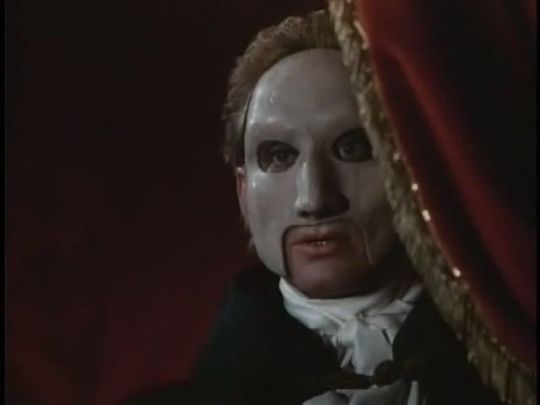
Carriere and Erik's mother had him out of wedlock, so technically Erik's last name legally would be his mother's (she's referred to only by the mononym "Belladova"), but ~shrugs~. The basic plot is the same old story, except there's no "Angel of Music" charade, the Changy boy is called "Phillipe" rather than Raoul, it's set in the Edwardian Era rather than the 1880's and Erik's mother loved him, rather than rejected him, but died early. Also he was raised by his father. This version of Erik is EXTREMELY popular. He's not my favourite, but he's definitely a phan-phavorite. He's quite a gentle take on the Erik character, which is part of his popularity. You can find this version on YouTube if it tickles your curiosity. The Robert Englund version is a bit harder to track down but I recommend watching both at least once.
#ask box#poto 1989#poto 1990#charles dance#cherik#fredrik#robert englund#poto#phantom of the opera#erik the phantom#erik poto#poto erik
72 notes
·
View notes
Text
Theory: Whiteknight ship baiting is part of Knightfall... not coping
New year, new day, new piece of pro Knightfall propaganda, this time laced with bit of copium. This is gonna be relatively short one.
First of all, let's get obvious explanation of it out the way: Whiteknight ship baiting from last 2 volumes is not part of Knightfall.... it's you know... part of Whiteknight. It's not some kind of 360 IQ plan that ends in completely different outcome, it's just straightforward romantic relationship.
Now with sanity out the way, let's get back to Knightfall. Why would Whiteknight ship baiting be part of Knightfall? It's simple, it works well with both Cinder's and Jaune's primary literary influence.
How it factors in Cinderella story is more obvious. Throughout her childhood, Cinder is slave of Atlas, while Weiss is its golden child. From Cinder's perspective Weiss represents everything wrong with Atlas and everything she feels she was denied during her childhood. This would make Weiss play a role of Cinder's stepsister. And of course, Cinderella's stepsister desires Prince (Jaune and Ruby are most Prince like characters in Cinder's story), but in the end Prince chooses Cinderella.
However, there just as obvious counterpoint: Cinder plays a role of Evil Queen in Weiss' Snow White story (both being vain older female characters, envious of Snow White and repeatedly trying to kill her). So if perspective is flipped from Cinder to Weiss, then Cinder is gonna lose in the end and Weiss is gonna have a happy ending with her Prince (who once again is seemingly Jaune shaped).
So, what to do now? Well, we check the Prince's perspective, that is, check if there is anything of sort in Joan of Arc story. For the sake of the argument, I'll avoid using my Joan of Arc/Indecisive King theory: That screams Knightfall, but I wanna observe this in vacuum. I'll link it below if you wanna check it out.
So, anyways, back to Joan of Arc story. After her village was burned for the second time, Joan and her family flee to the town of Neufchateau. There she meets a suitor who claims she promised herself to him. Joan denies that ever happened and rejects the suitor, defying the wishes of her family. Instead she continues her mission of getting an audience with king Charles VII.
So, why do I look at this and see failed Whiteknight? Few reasons.
Timeline placement. This event takes place after Joan's village was burned for the second time. While first time villagers were unprepared and lost pretty much everything, second time they evacuated themselves and their belongings in time, preventing most of the damage. In RWBY this translates to Fall of Beacon and Atlas. While they were caught off guard at Beacon, in Atlas, they managed to evacuate most of the citizens via relic created portals. Villagers took refuge in Neufchateau, similar to how everyone was evacuated to Vacuo. Most of the ship baiting takes place in volumes 8 and 9 and will probably continue in Vacuo portion of the story. So timeline wise that matches.
Weiss fits best as the suitor. Why do I think that? Why Weiss and not quite literally any other female character? She matches limited traits we are given about Joan's suitor. She has shared history with Jaune (and Jaune's constant hounding of Weiss from early volumes could be interpreted as supposed promise of marriage) and her proposal would have approval of Jaune's loved ones (his friends in this case). I cannot find a single other potential Jaune ship that fits both (Lancaster is bit lacking in the first one since it's almost completely platonic, Knightfall and Silent Knight fail at both criteria).
She is the only character that seems to be romantically interested in Jaune at the moment... unless you believe yandere Cinder is canon.
So if Jaune's story is directly (or at least symbolically) following Joan of Arc story, then it's likely Jaune is gonna reject Weiss. Cool, but how does that factor into Knightfall?
Joan rejects her suitor and continuously tries to get an audience with the king (I'll once again ignore massive parallels between Cinder and king Charles VII and read this in vacuum). She goes against wishes of her parents, first by refusing suitor they approved, and then by going on her mission (something she kept in secret from her parents and was prohibited to pursue). So if we directly translate this into RWBY, that would mean Jaune will instead pursue a goal of meeting someone, going against wishes of his loved ones. That kind of narrows it down, don't you think.
Both events (Joan rejecting a suitor and her meeting with the king) will also be referenced at Joan's heresy trial. One of the most important transgressions here being the fact that she gave the crown to the king. Heretical implications? Related to the crown? My, my, that indeed does narrow it down quite a lot.
Anyways, that's enough shilling for today. If I missed something or you can find a different interpretations, feel free to comment
#rwby theory#cinder fall#jaune arc#rwby jaune arc#rwby cinder fall#rwby knightfall#knightfall#rwby weiss schnee#weiss schnee#rwby weiss
13 notes
·
View notes
Text
Beat You to the Phone (steddie)
@cosmos-lore asked: 40 steddie
Prompt: “I want a baby.”
Word Count: 2.4k
Warnings: homophobic slurs, grooming (in the context of eddie’s parents), parent death, parental abuse and trauma
A/N: i hope this is what u wanted! i took this in the angst/fluff route. for all my other readers who have sent in asks, fear not! i’m working on all of them as we speak. they’ll be rolling out soon, slowly but surely.

For as long as he could remember, Eddie Munson had sworn to himself that he would never, ever become a father. It wasn’t in his blood. It made sense, since his own dad didn’t have a cell of paternal instinct in his body, and the apple doesn’t fall far from the tree.
Charles Lancaster had never been a good man, let alone a good parent. After all, he had met sixteen year old Marie Munson when he was twenty-five. He groomed and brainwashed her into thinking that she loved him before knocking her up. After Eddie was born, he was barely present, citing work as his reason for being an absent father.
The first five years of Eddie’s childhood were good. He never went without, and always felt safe. His mom was an angel on earth. She was the one who bought Eddie his first guitar, and taught him “Here Comes the Sun” by the Beatles for his first tune. She was the one who brought Eddie to have picnics in the park, with peanut butter and honey sandwiches. She was the one who’d tuck him in at night, say a short prayer, and kiss him on the forehead. She was always there for him, until she wasn’t. He had found Marie dead on the bathroom floor after his first day of kindergarten, and it was all downhill from there.
Charles had been selling drugs to keep himself (and Eddie, of course, how could he ever forget) afloat. It wasn’t long before he got caught carrying copious amounts of cocaine over state lines and was sent to prison, meanwhile Eddie was on the brink of being registered into the foster care system. That was, until Wayne Munson swooped in and saved the day. Or rather, saved Eddie’s entire future.
Wayne hated the phrase, “like his own.” He did not raise Eddie “like his own,” or love Eddie “like his own.” He raised and loved Eddie as his own. He saw his nephew as a son. From the first day that little Eddie ran into the trailer, stood still for a moment, then ran right back to Wayne to jump into his arms squealing, “Thank you Unc’o Wayne,” Wayne knew that he’d made the best decision of his life.
He watched Eddie grow up. Eddie became fascinated with fantasy and mythology, and Wayne watched him spend hours upon hours creating characters for that dungeons game he was always talking about. He watched Eddie play his acoustic guitar, scribbling lyrics into his marble composition notebook. Wayne always felt as if he was looking right at his sister whenever Eddie would play. He watched Eddie approach the trailer with a black eye, asking Wayne what a “faggot” was. They had a long talk that night, filled with hot cocoa and tears.
Years later, in 1986, he watched police carry a girl (Chrissy, they called her) out of his home who looked like she’d been tossed off a cliff. He watched the entire town lose its collective mind and accuse his nephew, his son, of murdering that poor girl. He watched Eddie return home, half dead, carried on the back of a kid with the most terrified look on his face, as if he were to say, “I need him alive just as much as you do.”
He watched as Eddie brought that same kid home one sunny day in 1987, and his suspicions were right on the money. His name was Steve, Steve Harrington, and he had the tallest hair that Wayne had ever seen. “He’s my boyfriend, and I love him,” Eddie had said. Wayne could have been skeptical; after all, he was a Harrington, but he had saved Eddie's life. And for that, he loved him too. He didn’t even hesitate to say yes when Steve was kicked out of his parents' home for his sexuality.
Though they were young, they got married in a small ceremony in the company of friends and family in May of 1989. Eddie and Steve moved into their own trailer, right next to Wayne. That way, he was close by if they needed anything, and could also maintain some sense of safety for his nephew and his illegal husband.
The topic of grandkids was never really discussed. Wayne knew how adamant Eddie was about not turning up like his father, and if not having kids was part of that vow, then so be it. He respected that. However, Wayne had absolutely no idea about the conversation that was happening next door.
—
“I want a baby,” Eddie heard Steve whisper in his ear. They’d been cuddling that morning for the past half hour and Eddie was just about to fall back asleep. His eyes snapped open at what his husband had just suggested.
“Jesus H. Christ, Steve, warn a person!” he turned around from his little spoon position to face Steve, who was blushing red and removing his hands from Eddie’s waist to cover his face in embarrassment.
“Shit, I should have prefaced it or something,” he shook his head. “Sorry. It’s not like it could actually happen anyway, because… well, you know.”
“Yeah, I know,” Eddie chuckled, reaching up to caress Steve’s cheek with his cold rings, which he knew he loved. He leaned into the touch as Eddie continued, “And that’s kind of a blessing in itself, because I honestly don’t want kids.”
Now it was Steve’s turn for his eyes to snap open. “But like, you know I’ve always wanted a family. And I want it with you. I want to have it all, the six kids in a Winnebago, the dog and cat, the whole nine yards.” Steve rolled away on the bed, laying on his back, leaving Eddie feeling colder than before. “And I swear to god, ever since Nance and Jonathan had Austin, I’ve had the worst baby fever that any man has ever had”
Of course Steve was jealous of Nancy and Jonathan. Who wouldn’t? They’d rekindled their relationship over the winter break of Nancy’s sophomore year at Emerson, and she wound up getting pregnant after one time of having sex before going back to school. But she persevered through school and endured the pregnancy, because she and Jonathan both wanted to start a family, even if she was only twenty and Jonathan was twenty one. Both of their families had been extremely supportive and accepting as well, which made things even harder for Steve to watch, because, why couldn’t he have that? Oh, right, because he was gay, and now because his husband didn’t want children.
“And you think I haven’t had it too?” Eddie sat up, running his fingers through his messy hair and looking down at Steve, whose face implied shock. “Believe me, I have! Do you know how much I want to be the dad I never had?” Eddie’s voice got wobbly. “To teach them D&D and guitar, to make funny voices for every single one of their stuffed animals, to make ring-o-noodle soup when they’re under the weather, to watch them standing backstage at one of my shows when they’re old enough?”
He cleared his throat before continuing. He could not cry. Not over this. “I want that more than anything! But what you don’t know is how sick to my stomach that makes me feel. The thought of me, Eddie Munson, as a fucking father? No way! It’s not in my genes, man.”
Steve sat up now, scooching towards Eddie and pulling him into his chest. Eddie obliged, because he could never resist Steve’s chest hair. It should have been illegal. “Well, man, will you maybe at least think about it?” Eddie shook his head and went to talk, but Steve spoke again, “It doesn’t even have to be through surrogacy, so it wouldn’t be biological if that’s what you’re worried about. I found this adoption agency in New York that just opened their doors to same sex couples—”
Steve was desperate. Eddie couldn’t help but roll his eyes. “No. I can’t. I just… it’s a whole thing. I don’t want to talk about it.”
“Okay,” Steve exhaled into Eddie’s hair, pulling him closer and squeezing his heavily tattooed bicep. “We can revisit this ‘whole thing’ another time.”
At that, Eddie pulled away once more, standing up next to the bed and looking down at his lover with disdain. “I don’t think you’re understanding what I’m saying. I don’t want a kid, I will never want a kid.” He paced for a few moments. “I can’t end up like my dad. He already haunts me, and he’s in fucking prison.”
“But you aren’t your dad!” Steve protested. “I for one think you’d be a great one! You’re so good with the teens.”
“Yeah, because I’m their dungeon master,” Eddie laughed incredulously, “I’m not feeding, clothing, and tucking them into bed every night.”
“Baby,” Steve said, standing up to join Eddie on his side of the room, “I know you’re scared, and I know you’re hesitant to even consider the thought of being a dad, but this is… fuck, this is everything I’ve ever wanted.” He took Eddie’s left hand in his own, rubbing his thumb over the black band on his ring finger. He heard the familiar clinking of metal against metal when his silver band collided with Eddie’s. “I lost my parents, and regardless of how shitty they were, they were still family. I lost the house, which was supposed to be in my name until I came out to them. And I lost my reputation, which I’ve been working for years to improve.”
Eddie dropped Steve’s hand, taking a step back. “Why, because King Steve can’t reign over his kingdom if he’s a fag, right?”
“King Steve died the moment Dustin dragged me back to my car in 1984, you know that,” Steve snapped. “You know damn well that’s not what I meant.”
“…But you thought about it,” Eddie replied in a deeper tone than usual that made Steve’s skin crawl.
“No, I—” he threw his hands up in the air, “I mean that I’m tired of sacrificing! Jesus, Munson, I gave up everything for you! The least you could do is put your feelings aside for this one thing!”
“Like I said, Munson,” Eddie retorted, their shared last name rolling off his tongue with fire, “I cannot, and will not change my mind about this. I am not fit to be a father, and to be honest, I don’t think you’re meant to be one either.” Eddie finally broke, feeling a tear run down his face.
“How can you say that to me?” Steve crossed his arms against his chest. “You’re just projecting your own insecurity onto me. That’s not fair.”
“Isn’t it, though? If you’re so upset about making sacrifices, good luck having kids. Because that’s what parenthood is alllll about. You put your own ambitions aside and support your kids through everything. You give them what they need, and even if you can’t, you find a way,” Eddie let out a choked sob, not even caring at this point. “You find a way, because your kids are not supposed to do it themselves. They’re supposed to be happy, carefree, stupid, funny, ignorant little shits who just want to be loved.” His heart was breaking with every sentence he spoke and the walls he’d constructed to protect himself were now crumbling to the ground. “No kid deserves to find their dead mom at home with her eyes still open. Steve, I see her eyes all the fucking time. They were bloodshot. I can’t listen to the Beatles, not because I hate them like I told you, but because my mom taught me all of their songs on the guitar and I can’t bear to hear them. I still feel the metal shears against my head from when my dad shaved it, telling me to ‘man up, I didn’t raise a fairy.’ I remember the way my dad would lose his temper and beat me until I passed out. I don’t want my past to affect how I would raise them. Like, what if I get angry and hit my own child? What if I make rash decisions and end up causing more harm and trauma than good? I’m absolutely terrified of being the antagonist in my kid’s life. And I’m absolutely terrified that you’re going to leave me for someone who can give you what I can’t.”
Steve’s expression softened, feeling absolutely horrible. He slowly moved back towards Eddie, who was trying his hardest to stop the flow of tears, but it wasn’t working. When Steve pulled him in for a hug, Eddie didn’t even object. He cried and cried into Steve’s shoulder, grasping onto the back of Steve’s shirt for dear life.
“I’m so, so sorry, my love,” Steve pulled back the slightest bit and kissed Eddie’s temple. “It’s okay, I understand. We don’t have to have kids. It’s okay, I was being selfish and wasn’t willing to listen to your side. I’m sorry.”
Eddie only shook his head. “No, you’re right. You’ve sacrificed so much for me, and I don’t want something like this to cause me to lose you.”
“You could never lose me, even if you tried,” Steve replied, to which Eddie barked out a laugh.
“I wouldn’t be so sure of that. Robin literally got us shirts that say ‘If found please return to Eddie’ and ‘I’m Eddie.’”
Steve pulled back and held Eddie’s face in his hands, wiping the stray tears off his cheeks. “We really are meant for each other, aren’t we?” he asked. “I can be okay with just us two. I love you.”
“I love you too,” Eddie replied, and leaned forward to kiss Steve. He wrapped his arms around Steve’s neck as Steve’s met his waist, pulling him in closer. Steve swiped his tongue over Eddie’s bottom lip, and he let him in, gasping for air while Steve let out a low moan. Eddie tugged at Steve’s hair, making him pull his head back from Eddie’s, feigning a pout.
“Eds… lemmemakeoutwithyou,” Steve whined, going to kiss Eddie again, but was stopped with a bony hand on his sternum.
“Before things go any further, I… I think we could maybe give that adoption agency a call.” Eddie said, and Steve’s eyes widened.
“Are you serious? Like, I don’t want you to do something you were very much against barely ten minutes ago. But if you are serious… can we?”
Eddie smirked, twirling a piece of Steve’s hair at the nape of his neck. “Beat you to the phone.”
#steddie#eddie munson#stranger things#steveddie#steve harrington#stranger things fic#stranger things 4#steve x eddie
64 notes
·
View notes
Text
List of unusual names found in Dickens novels
These are real first names of characters from Charles Dickens' novels. Some are weirder than others.
Affery
Alick
Angelo
Arethusa
Barnet
Bayham
Berinthia (shortened to 'Berry')
Bolaro
Chevy
Decimus
Diggory
Dingleby
Ethelinda
Ginery
Henerietty - combination of parents' names, Henery and Hetty
Jarvis
La Fayette
Lancaster
Lillyvick
Malthus
Malvina
Montague
Morleena - a name invented by the mother so that her child would stand out
Mulberry
Newman
Nicodemus (shortened to 'Noddy')
Ninetta
Pleasant
Prince - named after Prince Regent
Putnam
Quanko
Quebec, Malta, Woolwich - named after places they were born in
Snittle
Tudor
Tumley
Volumnia
Vulture
Wackford
Watt
Wilmot
Zephaniah
2 notes
·
View notes
Text
Movie Review | Scorpio (Winner, 1973)

You’d think a cynical cat and mouse spy thriller starring Burt Lancaster and Alain Delon (R.I.P.) would automatically be a good movie. But you’d be WRONG. Because this is directed by Michael Winner, who not only has no feel for the complications of the plot, but also coats everything in a drab brown palette to ensure the movie isn’t remotely fun to look at. I won’t pretend that Winner’s collaborations with Charles Bronson are well made movies, but at least in those he found a synergy between style, subject matter and performance that’s mostly absent here.
Shockingly for a Winner joint, the politics aren’t terrible. This takes a pretty cynical view of the CIA and Cold War espionage. Not that Winner has a feel for any of this. This movie needed to manage a chilly temperature, something that the cologne ad sheen is not conducive to. A bit more at home for Winner is the treatment of the female characters, which is pretty ugly, but at least he seems engaged with this element.
All that being said, there is one really good chase scene where Winner’s unfussy style complements the sense of physical exertion, and a nice supporting performance by Paul Scofield. And any Canadian watching this will cheer when they reference Air Canada as part of Burt’s getaway plan. Also fun to see Alain play a cat lover, but a lot less fun to see Burt put on blackface.
2 notes
·
View notes
Text
No crunking, but lots of haterating and hollerating and even some situations:
BRUTE FORCE (1947): Aptly named prison drama about a group of convicts (including Burt Lancaster, Charles Bickford, and radio actor Howard Duff) in a battle of wills and wits with the sadistic guard captain Munsey (Hume Cronyn). Forcefully directed by Jules Dasssin and certainly vivid, but the few moments of levity the Richard Brooks screenplay provides — such as a droll flashback sequence where former conman Spencer (John Hoyt, who later played Dr. Phillip Boyce in the original STAR TREK pilot) affectionately recalls the slick dame (Anita Colby) who once robbed him with his own gun — serve mostly to demonstrate that there's not enough light moments, even for such a determinedly grim and downbeat story. Worse, since the main action takes place entirely within the prison, women (including Ella Raines, Ann Blyth, and future TV Batgirl Yvonne De Carlo as well as Anita Colby) appear only in brief flashbacks. The film's main attraction is its superb acting — and even Lancaster's brooding sex appeal is somewhat overshadowed by Hume Cronyn's towering performance as the magnificently detestable Munsey. CONTAINS LESBIANS? Nope. VERDICT: Compelling in fits and starts, and Cronyn's Munsey is one of the screen's greatest villains, but it's so oppressive that your attention may start to wander, especially if neither Lancaster nor Cronin is currently onscreen.
HOTEL COCAINE Season 1 (2024): Colorful but sloppy Chris Brancato crime drama, based (apparently very loosely) on the life of a real person, Cuban exile and CIA asset Roman Compte (played, weakly, by Danny Pino), who, as the general manager of Miami's Mutiny Hotel, presided over the heyday of coke-fueled late '70s South Florida hedonism. Brancato uses this as a backdrop for a disappointingly ordinary gangster story, giving Compte a fictional older brother, Nestor Cabal (Yul Vázquez), indistinguishable from Brancato's previous fictionalization of Cuban cop/gangster José Battle Sr. in GODFATHER OF HARLEM (where he was also played by Vázquez), and pitting the brothers against a renegade DEA agent (Michael Chiklis) and an invading Columbian cartel led by Gilberto Henao (Juan Pablo Raba). Despite the title, the Mutiny setting is surprisingly under-utilized; the main plot is cliché-ridden and often listless; and the action is broken up by periodic fits of weird comic relief involving nervous acid-freak hotel owner Burton Greenberg (Mark Feuerstein), including bizarre appearances by Hunter S. Thompson (John Ventimiglia) and Rick James (Larry Powell) in the first two episodes. Pino is barely adequate in the lead, and it sometimes seems like Brancato foolishly expects viewers to find Roman sympathetic, which he really never is, even compared to his antagonists. The only real reasons to bother with the show are its Latina characters, including Roman's spunky teenage daughter Valeria (Corina Bradley); his sympathetic girlfriend Marisol (Tania Watson); and in particular Gilberto's sexy and sadistic Mexican enforcer/girlfriend Yolanda (Mayra Hermosillo). Alas, Laura Gordon is awful as Roman's loyal right-hand woman Janice, while Michael Chiklis, who had made such a strong impression as the antiheroic Vic Mackey on THE SHIELD, is just laughable as DEA agent Zulio. CONTAINS LESBIANS: Not in any meaningful way. VERDICT: Never dull, but too arch to be credible and yet not over the top enough to rival De Palma's SCARFACE, and unlike the similar but better-realized GODFATHER OF HARLEM, it has no particular insights to offer about either its era or its setting.
SEX-POSITIVE (2024): Cute but very dumb sex comedy, directed by Peter Woodward (who also co-scripted with Marie Kirby) about a down-on-her-luck young woman (Katherine Ellis) who moves into a New Orleans commune and, after her initial shock has subsided, becomes part of its loose-knit polycule of ongoing sex parties. The story tries hard to live up to its title, with mixed results: It largely avoids the performative dread sex comedies often evince at the idea of same-gender sex, and it even takes a few flailing stabs at body positivity, but much of its humor is still founded on the idea that people having a lot of (semi-public, maybe mildly kinky) sex is inherently outrageous, which means that if you don't blush and giggle at the mere idea of a sex party, the movie is only occasionally funny. On the other hand, it's refreshing to see a modern sex comedy that doesn't shy away from nudity, allows the characters to actually have sex rather than just talking about it, and doesn't paint the characters' promiscuous lifestyle as a moral failing that has to eventually be recanted. CONTAINS LESBIANS: Yes, although the script leans a little too hard on the idea that anything other than complete sexual fluidity is somehow regressive. VERDICT: In a less prudish cultural climate, a low-wattage comedy like SEX-POSITIVE would barely rate a yawn, but in an era of rampant self-censorship and dreary bourgeoisie repression, its dopey, good-natured smuttiness is sort of endearing.
SUNRISE AT CAMPOBELLO (1960): Okay Dore Schary film adaptation (directed by Vincent Donehue) of Schary's Tony-winning play, starring Ralph Bellamy (reprising his award-winning stage role) as Franklin Delano Roosevelt, recently stricken with infantile paralysis and struggling to decide if he can still have a political future, with Greer Garson as Eleanor, Ann Shoemaker as Franklin's imperious mother Sara, and Hume Cronyn as his friend and political advisor Louis Howe. At first, both Bellamy and Garson seem like they're overplaying their roles, with a bigness more suited to stage than screen; Garson's performance never really stops feeling like caricature, but Bellamy eventually disappears into his part and becomes surprisingly convincing. Cronyn and Shoemaker are both excellent, and extensive use of location shooting (including scenes staged in the Roosevelts' actual homes) keeps the film from feeling objectionably stage-bound, but the narrative's emphasis on the heroism of overcoming chronic illness (a struggle FDR took great pains to conceal as much as possible) is awfully sticky at points, and if you're not American, you may wonder what all the fuss is about. CONTAINS LESBIANS: There have been arguments for years about Eleanor (in particular surrounding her relationship with reporter Lorena Hickok), but you'll find none of that here. VERDICT: As biopics go, it's pretty top-drawer, but if you're not a history buff or don't care about the Roosevelts, it probably won't hold your interest.
#hateration holleration#movies#teevee#brute force#mark hellinger#burt lancaster#hume cronyn#john hoyt#chris brancato#hotel cocaine#mayra hermosillo#michael chiklis#danny pino#yul vazquez#mark feuerstein#sex-positive#peter woodward#katherine ellis#sunrise at campobello#dore schary#ralph bellamy#greer carson#ann shoemaker#franklin delano roosevelt#eleanor roosevelt#the main reason to watch hotel cocaine is mayra hermosillo#who is distractingly hot#shame about the show#it does also have#tania watson
3 notes
·
View notes
Text
VERSE INFO - RED DEAD REDEMPTION
AGE: 35
OCCUPATION: Farmer, but like. Not good at it
SETTING: Various — The Years 1899-1907
Caleb is an ex-soldier, one haunted by his past indiscretions in being drafted to fight in the Messiah War (or RDR-universe equivalent), a battle between the US Army and Indigenous American tribes in which the federal government broke established treaties and provoked many tribes into violent retaliation to justify attacking them in response.
At first, Caleb doesn't know any better, he's a boy of 19 manipulated heavily into thinking he's doing the right thing, coerced into following orders that go against his moral compass. He's prescribed opium by his unit's army doctor to cope with his resulting anxieties. Gaslighted about certain actions the army carried out. Told these things never happened at all or were performed by someone else and that the army is blameless. He gets the feeling this isn't true, but can't prove it. He relies even heavier on opium usage and becomes addicted.
Caleb's superior officers know it’s only a matter of time before he goes looking for answers to questions he shouldn’t ask, and they figure he’s so dulled by the drug, he won't even notice when they command another soldier to fire on him. The shot doesn’t kill him as intended, but it solves their problem anyway as Caleb can’t go poking around in military affairs anymore.
After he recovers from the wound, Caleb is given an honorable discharge and granted a homestead to settle at, where he tries to leave the past behind and build a new life for himself as a farmer. He's pretty new to farming and ranching, and maybe not completely hopeless at it, but definitely very inexperienced. A plot of land near Cumberland Forest isn’t really the best for someone just starting out, either.
To get by, he turns to work outside of farming. He doesn't really care who he's working for as long as they don't harm people he perceives as innocent. Sometimes that sense of innocence includes certain types of criminals.
Caleb is skilled with a wide variety of firearms due to his training from being a soldier, his preferred sidearm is a classic Cattleman Revolver (which I *think* is based on the Colt Peacemaker aka Single Action Army Revolver and would've been standard issue for military servicemen in the 1880s but. don't quote me on that).
His preferred longarm is the Lancaster Repeater (based on the Winchester Yellow Boy Carbine Rifle)
Whereas in Westworld, morality tends to be highlighted using the classic black hat/white hat dichotomy traditionally seen in western media, the RDR universe tends to base its view of morality on the dichotomy of red and blue instead (although some hat symbolism is still present and sometimes subverted i.e. Micah wears a white hat but is villainous). Honorable/morally ‘good’ characters often wear blue (i.e. Hosea, Charles, Javier, etc.) and dishonorable/morally ‘bad’ characters wear red (i.e. Micah, Bill, Dutch, etc.). (Plus depending on Arthur's honor level when you buy the Whittemore suit in “A Fine Night of Debauchery” you get the blue tie and vest if you have high honor or the red tie and vest if you have low honor.)
In keeping with this theme, Caleb is seen as a good man, an honorable character, and wears some blue. Otherwise, most of his everyday clothes are honestly just various shades of brown, gray, and off-white.
#the difference between a good man and a bad one is the choice of the cause — red dead redemption.#verse info.#i said i was thinking about fallout and westworld earlier#and then suddenly rdr2 was like surprise motherfucker#so that's. where i am i guess#i've been meaning to get this up for a while#tw addiction#tw opiates#tw drug use#ask to tag
2 notes
·
View notes
Text












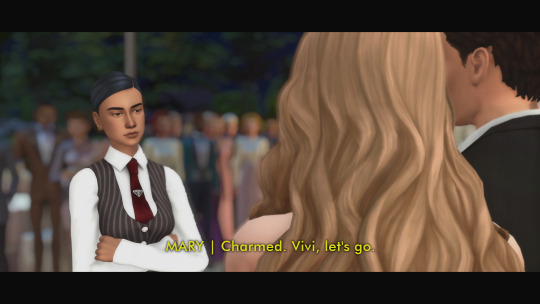










Previous | Chapter Start | Beginning | Next
author's note: I have no idea why, but this post took me over a week to put together. Sometimes you just get stuck! shout out to @the-lancasters for sitting with me through like 19 revisions!!!
Transcript under the cut!
8:00 PM / August 6th, 2016
JOSIE | Are you ready, girls?
FREDERICK | Roz looks ready to throw elbows.
MARY | [laughs] Roz doesn't stand a chance. Josie's aiming for Emily.
FREDERICK | She would not—
MARY | [amused] She would. D'you think your sister's the only one rooting for marriage and babies? Everyone's ready for another royal wedding.
FREDERICK | Uh, everyone but the royal bride and groom.
MARY | I think Emily is extremely ready, actually—
VIVI | ...it's too bad Victoria couldn't come.
CHARLES | I suppose...well, what about you? Where is your husband?
VIVI | Jacques? [laughs] He hates weddings.
CHARLES | So I have you all to myself tonight.
VIVI | [laughs] You won't have me for long. Early to bed, early to rise...
CHARLES | So you're abandoning me? Absolutely heartless.
VIVI | Really? Abandoning you?
CHARLES | Yes, abandoning me. Leaving me all alone, no one else to talk to...
VIVI | ...just an important man, surrounded by important men.
CHARLES | And all those important men wish they were talking to you.
VIVI | [nervous laugh] Don't be absurd.
CHARLES | It's the truth. You have many admirers, Vivi.
JOSIE | Okaaaaay...three! Two! One!
MARY | See? Told you. Emily was always going to catch it.
FREDERICK | Hey. The bouquet toss is just for fun, right? Like, no one's going to expect me to propose tonight...right?
FREDERICK | [quietly] Oh hell. [loudly] GOOD JOB, EM!
MARY | Excuse me...
MARY | Good evening, your highness.
CHARLES | Sorry, have we met?
VIVI | Hi, Mary...Charles, Mary is a. Um. Friend of Rosalind's...
MARY | Charmed. Vivi, let's go.
VIVI | I wasn't doing anything wrong—
MARY | I didn't say you were.
VIVI | Charles is a friend, I wasn't flirting with him.
VIVI | Mary, it's not a crime to talk to a friend at a wedding.
MARY | Your marriage is none of my business you see how this looks, right?
MARY | Vivi, you're the most famous woman in the country. People are paying attention to who you talk to and how you talk to them. If you don't want rumors to ruin your life, you've got to stay on guard.
FREDERICK | Should I congratulate you for your mad hops, or Josie for her aim?
EMILY | Hm....me, I think.
FREDERICK | In that case, I suppose congratulations are in order.
EMILY | Thank you, Frederick. You know...I'm not expecting a proposal tonight.
FREDERICK | [immensely relieved] Oh.
EMILY | I'd never marry anyone gauche enough to propose at a wedding.
FREDERICK | Heh. Of course not, that would be...frightfully common, wouldn't it?
EMILY | Oh, dreadfully so. I expect to be proposed to in a hunting lodge.
EMILY | [offscreen] ...Er. N-not that I'm in any rush to be proposed to!
FREDERICK | [offscreen] Thank goodness.
FREDERICK | [offscreen] Honestly I don't know why some people are...
EMILY | [offscreen] I mean, I'd like to get married someday...
FREDERICK | [offscreen] I mean, someday, sure..!
FREDERICK | [offscreen] ...but honestly. All my married friends are miserable.
#armorica story#chapter 2#chapter 2 part 3#character: josie logan#character: frederick st. fleur#character: mary yokoyama#character: vivienne meijer#character: charles lancaster#character: rosalind st. fleur#character: emily chandra#armorica collabs#the-lancasters
32 notes
·
View notes
Photo

Chapter 2.5 coming Monday 17th April!
I’ve had a lovely break over March and I've enjoyed working on a bit of a side project to my story! Something that really interests me is the people who work for Royalty and what that must be like to be a part of such a complicated workplace formed around (in this case) two people - Charles and Victoria.
In Chapter 1 I introduced you to Sarah and Marcus - Private Secretaries to Charles and Victoria. A definition I found for this job says that the Private Secretary's Office supports their principal in their duties, organising official programmes, and taking responsibility for everything from speeches and correspondence to official presents and congratulatory messages to members of the public.
Their relationship is adversarial - a clash of strong personalities. This chapter will further explore the characters of Marcus and Sarah - what makes them tick, why they work for the Royal Family and answer the question is can they figure out a way to work together in peace? If not for each other but for the good of the Crown Prince Couple?
It will take the format of approximately 35 posts - one post per week day from Monday
✨ I hope you enjoy this short story but if not - then Ill be back to the Lancasters in no time at all! ✨
#the sims 4 royal#the sims 4 story#the sims 4 storytelling#the sims 4 legacy#the sims 4 royal family#the sims 4 royal simblr#the sims 4 royalty#the sims 4 simblr#ts4 legacy#ts4 story#ts4 simblr#ts4 characters#ts4 royal#ts4 storytelling#ts4 royalty#ts4 royal family#ts4 royals#sims 4 story#sims 4 royalty#sims 4 legacy#lancasterchaptertwopointfive
18 notes
·
View notes
Note
I am lowkey highkey obsessed with Thomas. He comes across as having a streak of earnestness in some things I read (it was either his knightly brotherhood agreement with Charles Duke of Orleans or his letter to Henry about how awful his situation in Ireland was) but I also like the hotheaded, reckless image of him. I think a lot of modern historians either overlook him because he wasn't around for Henry VI's minority or just tend to assume that the Battle of Bauge tells us everything about his personality and thus we end up at the hotheaded, reckless idiot image.
(also re: Henry; I think CGW says something like he could have been a good king but the way he became king meant he could never be a good king because usurpation left too great a stain on his character. That makes a lot of sense to me. Plus he got so sick just as he was starting to gain stability on the throne… you can almost sort of read this trend of Henry being like "time for kingly awesomeness! (a fun party ala Edward III; going on a military campaign)" and then ending up having another rebellion or health crisis. The dickhead was still doing it up to 1412 - he was going to lead Thomas's expedition! Until he couldn't…)
(I have written and re-written this so many times to try and clearly explain my view and I'm still not happy with it v.v)
I kind of like the mental image of Thomas as a hot head, but a hot head with a heart of gold iykwim. It really annoys me that we don't know more about him, because reading about his stint in Ireland and campaign in France knowing how much people wanted him to be heir instead of Hal really just... baffled me. The failure of those two things don't exclusively or even predominately fall on his head, it just doesn't explain why people were so ready to back him over Hal, who already had a quashed rebellion under his belt (it'd be easy to brush it off as just people really hating Hal, which they did seem to, but they also seemed to genuinely want Thomas). I think it mostly comes down to Thomas' strengths being in areas that weren't necessarily conducive to leading a country, the way Hal, John, and likely Philippa's were, but we only know of those strengths because we have been able to evaluate their and their successors achievements to examine what does make a good monarch.
CGW coming to that conclusion about Henry IV didn't make a lot of sense to me, because that book did a really good job at detailing all the ways Henry was ill-equipped to be king ^.^'''' A lot of it was definitely because of him being a usurper, like being unable to convince parliament to raise taxes because they would leverage his own promises against him, or his habit of basically never standing up for himself and then going too far in the other direction, realising how much he screwed up, and then swinging too far back again (see the Scrope debacle). And even without all the ways his being a usurper affected him, there are so many instances of him straining against the monetary confines he now has to live with (I understand why he wanted the Duchy of Lancaster to be kept separate from the crown. Terrible outcome, but understandable), or wanting to be on crusade and not being able to because he is king, or the trouble he went through for marrying Joanna because it wasn't a good marriage for a king... all of it very much suggests to me that again, the 'princely virtues' he was so often praised for over Richard did nothing to actually prepare him for running a government, and there is a lot that suggests to me he didn't enjoy it. I guess you give him more credit that I do
30 notes
·
View notes
Note
Just to note what IMDB says about Ramsey:
The character Ramsay Bolton is a complete and utter monster and an incredibly vicious psychopath who is also a sadist. He enjoys feeding people to vicious dogs for his own sick pleasure. Each scene with him is incredibly frightening.
Many viewers will find parts of Season 3 disturbing in the fact that a major character is held hostage by a psychopath. Afterwards the nature and identity of the character being tortured is forcefully changed because of the physical and psychological torture. The character is enslaved by the torturer.
From what I remember from Fire and Blood, the most Aemond did was burn the River lands. Yes, he murders lots of innocent people, but he doesn't hold them hostage, torture them, etc.
The only things IMDB currently has on Aemond are about his eye and Vhagar eating Lucerys.
To add the whole Joffery thing:
The inspiration for Joffrey Baratheon draws from many sadistic and unbalanced rulers, such as Roman emperor Caligula, and 15th-century English prince Edward of Lancaster. He was also inspired by Richard II, who was an inexperienced boy-king who constantly misused his powers. He became a ruthless, vengeful tyrant who caused his own downfall by making many powerful enemies.
Both Charles Dance (Tywin Lannister) and Jack Gleeson (Joffrey Baratheon) were appalled and disgusted at their characters' treatment of their son and uncle, Tyrion Lannister. Dance remarked that it was extremely difficult for him to mistreat a genuinely nice man like Peter Dinklage, so much so, that Dance kept apologizing to Dinklage between takes.
Put simply:
Aemond = murderer, and arsonist
Ramsey = psychopath, sadist, rapist + other things I can't remember
Joffrey = sadist, cruel, evil
Aegon = rapist, drunk
I don't think it gets worse than Ramsay to be honest. He's awful in every conceivable way.
23 notes
·
View notes
Text
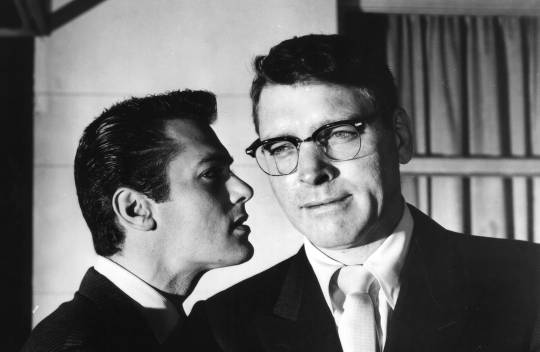
Tony Curtis and Burt Lancaster in Sweet Smell of Success (Alexander Mackendrick, 1957)
Cast: Burt Lancaster, Tony Curtis, Susan Harrison, Martin Milner, Jeff Donnell, Sam Levene, Joe Frisco, Barbara Nichols, Emile Meyer, Edith Atwater. Screenplay: Clifford Odets, Ernest Lehman, based on a novel by Lehman. Cinematography: James Wong Howe. Art direction: Edward Carrere. Film editing: Alan Crosland Jr. Music: Elmer Bernstein.
What do Sweet Smell of Success, His Girl Friday (Howard Hawks, 1940), Sullivan's Travels (Preston Sturges, 1941), and The Searchers (John Ford, 1956) have in common? They are all among the critically acclaimed films that, among other honors, have been selected for inclusion in the National Film Registry of the Library of Congress. And none of them received a single nomination in any category for the Academy Awards. Sweet Smell is, of course, a wickedly cynical film about two of the most egregious anti-heroes, New York newspaper columnist J.J. Hunsecker (Burt Lancaster) and press agent Sidney Falco (Tony Curtis), ever to appear in a film. They make the gangsters of Francis Ford Coppola's and Martin Scorsese's films look like Boy Scouts. So given the inclination of the Academy of Motion Picture Arts and Sciences to stay on the good side of columnists and publicists, we might expect it to shy away from honoring the film with Oscars. But consider the categories in which it might have been nominated. The best picture Oscar for 1957 went to The Bridge on the River Kwai (David Lean), a respectable choice, and Sidney Lumet's tensely entertaining 12 Angry Men certainly deserved the nomination it received. But in what ways are the other nominees -- Peyton Place (Mark Robson), Sayonara (Joshua Logan), and Witness for the Prosecution (Billy Wilder) -- superior to Sweet Smell? The best actor Oscar winner was Alec Guinness for The Bridge on the River Kwai, another plausible choice. But Tony Curtis gave the performance of his career as Sidney Falco, overcoming his "pretty boy" image -- in fact, the film makes fun of it: One character refers to him as "Eyelashes" -- by digging deep into his roots growing up in The Bronx. Burt Lancaster would win an Oscar three years later for Elmer Gantry (Richard Brooks), a more showy but less controlled performance than the one he gives here. Either or both of them would have been better nominees than Marlon Brando was for his lazy turn in Sayonara, Anthony Franciosa in A Hatful of Rain (Fred Zinnemann), Charles Laughton in Witness for the Prosecution, and Anthony Quinn in Wild Is the Wind (George Cukor). The dialogue provided by Clifford Odets and Ernest Lehman for the film crackles and stings -- there is probably no more quotable, or stolen from, screenplay, yet it went unnominated. So did James Wong Howe's eloquent black-and-white cinematography, showing off the neon-lighted Broadway in a sinister fashion, and Elmer Bernstein's atmospheric score mixed well with the jazz sequences featuring the Chico Hamilton Quintet. Even the performers in the film who probably didn't merit nominations make solid contributions: Martin Milner is miscast as the jazz musician who falls for Hunsecker's sister (Susan Harrison), but he hasn't yet fallen into the blandness of his famous TV roles on Route 66 and Adam-12, and Barbara Nichols, who had a long career playing floozies in movies and on TV, is surprisingly touching as Rita, one of the pawns Sidney uses to get ahead. As a director, Alexander Mackendrick is best known for the comedies he did at Britain's Ealing Studios with Alec Guinness, The Man in the White Suit (1951) and The Ladykillers (1955). His work on Sweet Smell was complicated by clashes with Lancaster, who was one of the film's executive producers, and after making a few more films he accepted a position at the film school at the California Institute of the Arts in 1967, where he spent the rest of his career.
5 notes
·
View notes